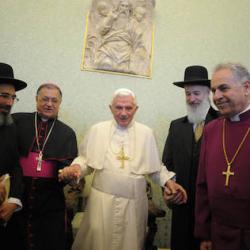I have only two quick responses to Toby Sumpter’s generous and thoughtful review of (a part of) The End of Protestantism.
First, he expresses the wish that I would have called the book The End of Denominationalism or somesuch, hinting that I chose the title because of its rhetorical punch. It does have rhetorical punch, I grant. But I (and Brazos) gave it the title we did because the end of Protestantism is the end game. As I discussed recently, Protestantism can be understood as a doctrinal system (but whose?) or as a family of churches. In the latter sense, Protestantism is by definition not-Catholic and not-Orthodox and not-Pentecostal. In that latter sense, the church won’t be unified until the family of churches now called “Protestant” function as un-denominated churches. As I’ve stressed, by the same argument, the unity of the church means the end of all other families of the divided church too.
If we Protestants are going to defend our separate identity no matter what, if nothing is going to make us die, we are setting ourselves on a collision course with the Lord of the church.
Second, Toby wonders why I make “confessionalism” the “boogyman” of my story. I don’t. He confuses “confessionalism,” which I mention only in quotations from other writers, with “confessionalization.” The latter term doesn’t refer to the writing and teaching of catechisms and confessions per se. Rather, it’s a term used by recent historians to describe the political-ecclesial consolidation of the Reformation in the seventeenth century. Confessions were a component of confessionalization, but not the whole of it.
And I’m not committing a post-hoc fallacy. Confessionalization represents a deliberate effort not only to systematize doctrine but to retain 16th-century divisions among Protestant groups. And the nationalist import was also intentional: Confessionalization explains why, in many regions of German, “I’m German” is convertible with “I’m Lutheran.” National and religious identity were built up together, and built up in deliberate opposition to other national-religious complexes.
Lutherans and Reformed churches are still divided a half millennium after the Reformation because many Lutherans and Reformed Christians, for reasons as much political as theological, have wanted to remain divided.















